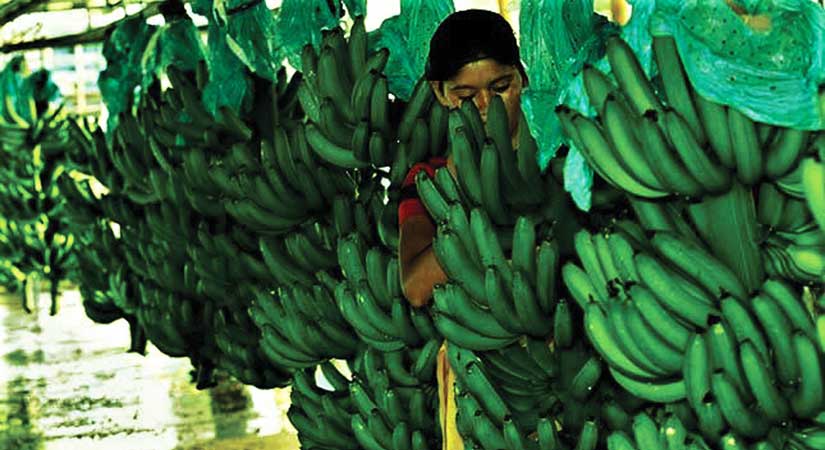
THE Department of Agriculture (DA) said it will set aside P262.7 million, partly from stimulus funds, for the banana industry, supporting measures to rehabilitate farms hit by Panama disease and develop disease-resistant varieties.
Agriculture Secretary William D. Dar said around P100 million has been appropriated under Republic Act No. 11494 or the Bayanihan to Recover as One Act (Bayanihan II) to rehabilitate banana farms hit by Panama disease, also known as fusarium wilt.
Fusarium wilt is caused by a soil-borne fungus.
According to the Philippine Statistics Authority, banana exports fell 10.7% year on year to $1.03 billion in the first seven months, with production dampened by fusarium wilt in Mindanao.
“If left unchecked, this will substantially reduce the Philippines’ exports, disrupt trade in the international markets, and cause suffering for banana growers, farmers, workers and their families, which may lead to social unrest,” Mr. Dar said.
An additional P120 million will be allotted to fund the development of the Cardava banana industry in 10 provinces — North Cotabato, Lanao Del Norte, Davao Del Sur, Agusan Del Norte, Samar, Leyte, Apayao, Cagayan, Quezon, and Oriental Mindoro.
The DA said it has set aside P42.7 million from its 2021 proposed budget to support banana research, the distribution of planting materials, and the upgrade of 14 tissue culture laboratories.
In a virtual meeting on Sept. 18, Mr. Dar urged the Pilipino Banana Growers and Exporters Association to match the DA’s P100 million and create a research and development program to address fusarium wilt.
“The research and development program will involve the establishment of a system to ensure banana production via tissue culture of quality resistant varieties and distributing these to farmers to rehabilitate and re-plant disease-damaged farms,” Mr. Dar said.
Separately, the Department of Science and Technology (DoST) has launched a three-year research and development program to examine another banana disease.
The DoST, through the Philippine Council for Agriculture, Aquatic and Natural Resources Research and Development (DoST-PCAARRD), will fund research into banana bract mosaic disease (BBrMD), to be carried out by researchers from the University of the Philippines Los Banos.
BBrMD, caused by the banana bract mosaic virus (BBrMV), is commonly found in Saba and Cardava bananas, but can also infect the Cavendish variety.
The disease causes mosaic patterns, discoloration, and streaks on various parts of the banana plant. Severe infection from the virus may lead to failure to flower, reducing yields by 40% to 70%.
“Despite its damaging impact on banana production, there is very limited information on the virus, its extent of infection in the country, and control,” DoST-PCAARRD said.
“To date, no synthetic chemicals and proper management practices are in place to control the disease. There are also minimal BBrMV-free planting materials available to banana farmers,” it added.
The three-year program aims to detect and study the genetic diversity of the virus, assess yield loss and nutrient management, and produce BBrMV-free planting materials, among others.
DoST-PCAARRD said the program hopes to compile incidence and distribution maps of the virus in the Philippines and data on the virus’ genetic relationships, alternative hosts, and yield loss data across various banana cultivars.
“Protocols on BBrMV detection and elimination, and improved micropropagation of BBrMV-free Saba are also expected to be developed,” DoST-PCARRD said.
The virus detection measures that will be optimized by the researchers will be made available to tissue culture laboratories to test for BBrMV in asymptomatic plants, to ensure that planting materials distributed to banana growers are safe to use.
“With the threat of BBrMD infection, the conduct of research and development activities to study and manage the disease is being prioritized to prevent its widespread occurrence,” DoST-PCAARRD said. — Revin Mikhael D. Ochave
